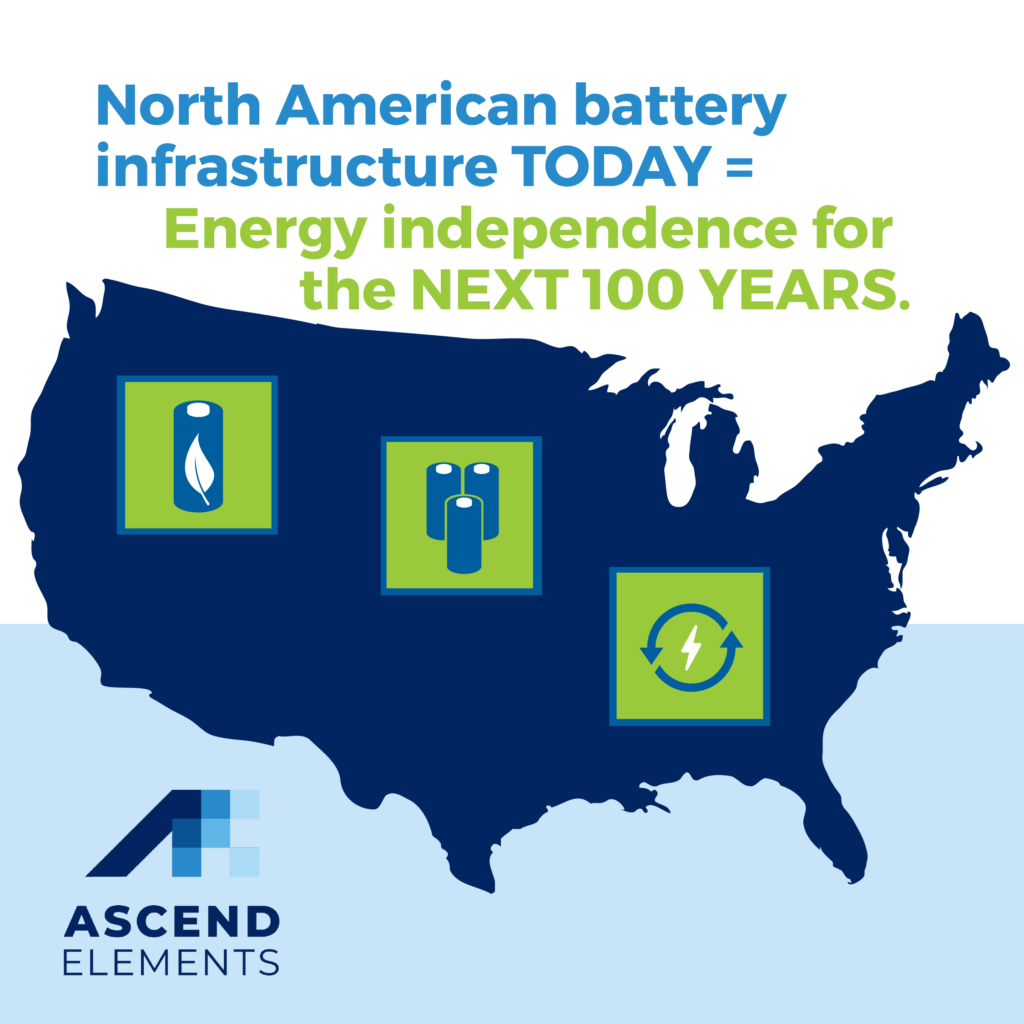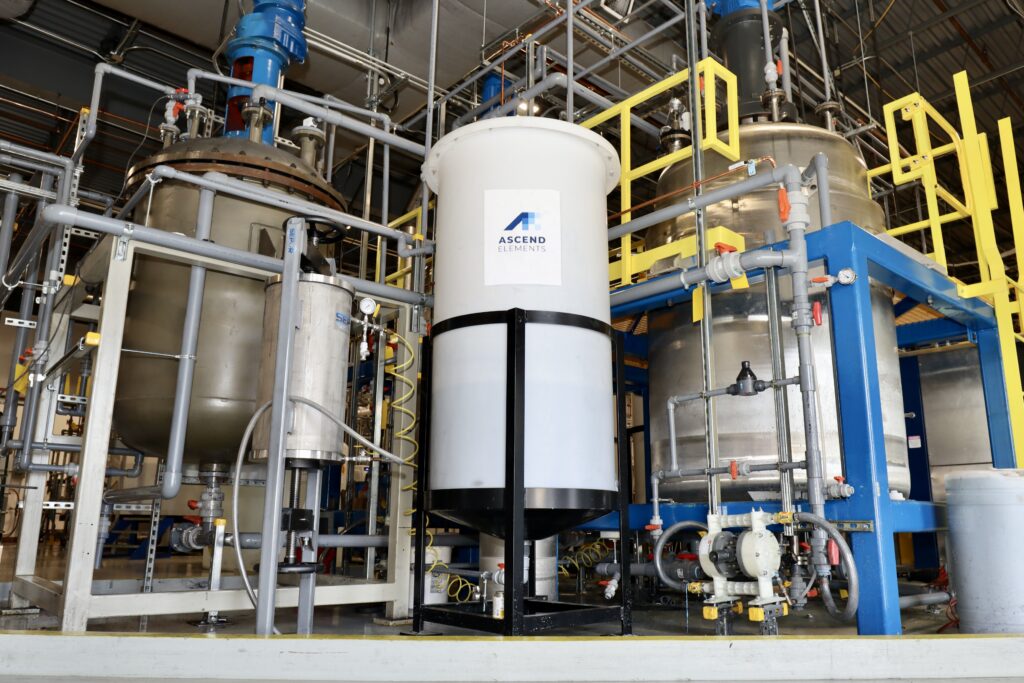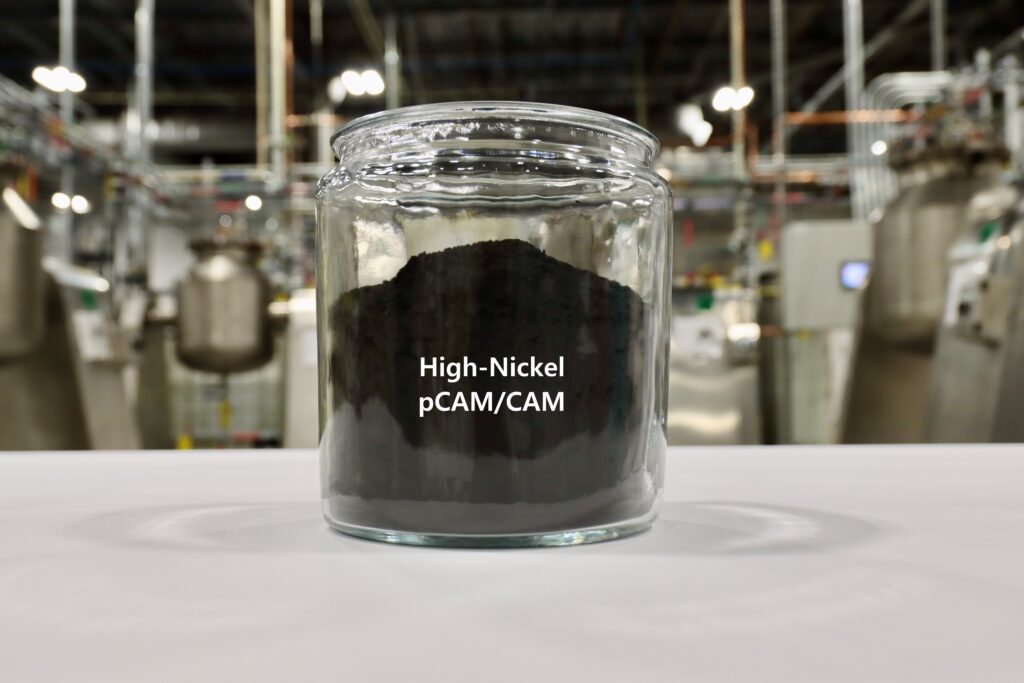Investment in the domestic lithium-ion battery manufacturing supply chain, catalyzed by battery recycling, is fundamental to environmental, societal and security goals.
by Roger Lin, VP of Marketing & Government Relations, Ascend Elements
Dramatic shifts in transportation and energy are taking place across the globe, reorganizing traditional markets and relationships among countries and regions. As a result, the battery manufacturing industry has become strategically important for the United States, both as part of the transition to a clean-energy economy, and as a key element of economic competitiveness and national security.

Lithium-ion batteries power critical U.S. industries
Just how important are these battery-powered innovations to the U.S.?
To start with, our auto industry generates $1.1 trillion each year, and 5.2% of all U.S. jobs depend on the automotive sector.[1] Transportation generates about 28% of U.S. greenhouse gas (GHG) emissions, having surpassed energy as the largest contributor.[2] Decarbonizing transportation using lithium-ion batteries will help address climate change, and “build a clean-energy economy that benefits all communities in an equitable and just manner.”[3]
Similarly, grid-scale energy storage is projected to grow five-fold by 2050, according to the National Renewable Energy Laboratory (NREL).[4] In fact, the deployment could total as much as 680 gigawatts by 2050. Such high levels of energy storage make it possible to integrate up to 80% renewable energy on the nation’s grid. Lithium-ion batteries are the leading technology to provide nearly all of that energy storage capacity.
To meet these projections, the U.S. needs a robust supply chain to produce state-of-the-art, reliable EV and grid storage batteries at scale. Battery manufacturing requires a variety of raw materials that must be mined, often from foreign countries that may be competitors or adversarial to U.S. interests. Yet, as use of lithium-ion batteries accelerates, we will soon see a tidal wave of batteries being retired. There is a huge opportunity to use battery recycling to make the industry more sustainable and bolster our economic, environmental and social progress.
Batteries require a variety of raw materials that must be mined, often from foreign countries that may be competitors or adversarial to U.S. interests.

U.S. National Blueprint for Lithium Batteries
The U.S. National Blueprint for Lithium Batteries[5], released in June of 2021, defines goals for a domestic closed-loop lithium-ion battery manufacturing industry that is critical to U.S. national goals. The U.S. Roadmap, in describing the vision for the lithium-battery supply chain, states:
By 2030, the United States and its partners will establish a secure battery materials and technology supply chain that supports long-term U.S. economic competitiveness and equitable job creation, enables decarbonization, advances social justice, and meets national security requirements.
Let’s explore how a domestic battery supply chain, with a closed-loop model using battery recycling, helps to achieve these objectives.
Economic competitiveness and equitable job creation
The National Blueprint details how the worldwide lithium-battery market is expected to grow by a factor of five to ten over the next decade. The U.S. battery industry must be well supported to respond to this massive market demand that may otherwise benefit well-resourced and supported competitors in Asia and Europe.
This is one of those rare issues with bipartisan support. For example, former President Trump signed an executive order to decrease foreign imports of critical minerals “that are increasingly necessary to maintain our economic and military strength in the 21st century.”[6] This year, President Biden ordered the Defense Production Act which calls for securing U.S. sources of critical materials and supporting “production and processing of minerals and materials used for large capacity batteries–such as lithium, nickel, cobalt, graphite, and manganese.”[7] These elements are largely mined and refined outside the U.S.
To help reduce such dependence, a closed-loop supply chain can generate needed materials by recycling spent batteries and manufacturing scrap. In fact, Ascend Element’s Hydro-to-Cathode™ direct precursor synthesis process creates high-end cathode materials that are less expensive to make than those from virgin sources, primarily due to the lower cost of the raw materials. Cathode active materials are the most expensive materials of lithium-ion batteries, so this reduced cost will help the domestic industry compete in the international markets.
The sources for spent batteries and scrap, as well as the manufacturing sites for EV batteries, are located across the country—from California to Georgia, from Texas to Michigan. In a closed-loop supply chain, battery recycling facilities are logically built near these sites, which creates workforce opportunities across the country. Co-locating these facilities alongside new battery production lines serves to further optimize the battery production cost structure and lower the environmental impact of the supply chain.
National security requirements and advances in social justice
The ongoing war in Ukraine – and Europe’s reliance on Russian fossil fuels – spotlights the need to find alternative sources of energy to power Western nations, including the United States. A clean energy economy built on batteries will minimize the power of any one supplier nation to threaten or influence others through oil and gas resources.

However, we can’t replace one source of unwelcome influence with another. Currently, China alone has around 79% of the global EV battery manufacturing capacity.[8] While China and the U.S. are currently active trading partners, we are also competitors in the automotive and clean energy sectors. Relying on China for so much of our battery source puts our economy at risk. No advanced nation can afford to be so reliant on another nation for critical resources.
Sourcing and recycling EV battery materials in the U.S. reduces our national reliance on foreign countries with which we may have military or economic conflicts. By sourcing more of the raw materials for EV batteries within our borders, including from recycling of spent batteries and manufacturing scrap, our country can also make a positive impact on the global battery supply chain. Domestic production reduces the demand for mining “conflict materials” that impact the environment and underprivileged populations, advancing social justice aims that are part of American policy.
No advanced nation can afford to be so reliant on another nation for critical resources.
Decarbonization – the prime driver
While it’s the third objective listed in the National Blueprint, decarbonization remains the driving force behind the push to electrify transportation and energy markets in the first place. EV battery recycling has a key role to play in this objective. Recycling requires much less energy than mining and refining to produce a given amount of battery materials. Batteries made with recycled products from the Hydro-to-Cathode direct precursor synthesis process, for example, can reduce carbon emissions at a lower manufacturing cost compared to batteries made from traditional virgin mined materials.
This recycling works to optimize the value of materials in the battery supply chain, thereby improving the economics of recycling EV batteries. The more value there is in spent batteries and scrap, the more industry players will choose to recycle, and to use recycled materials. We call this concept “upcycling” because it actually improves the economic value of all of the battery materials already in the supply chain.
With higher recycling rates, more realized revenue and lower environmental impact, the upcycling closed-loop model accelerates both critical materials manufacturing at scale as well as a full competitive value chain for the domestic industry.
A vibrant domestic battery industry meets all goals
As lithium-ion batteries become a fundamental part of our transportation, energy and other sectors, a vibrant domestic battery industry will be foundational not only for environmental stewardship, but also for sustaining our economic competitiveness, job creation, social justice and national security. A closed-loop model of upcycling spent lithium batteries and manufacturing scrap into valuable materials for industry is the best way to achieve all of these national priorities.

Roger Lin is the Vice President of Marketing & Government Relations at Ascend Elements. Based in Westborough, Mass., Ascend Elements is a vertically integrated lithium-ion battery recycling and engineered-materials company. Roger has nearly 20 years of experience in the lithium-ion battery industry.
[1] Alliance for Automotive Innovation, “Economic Insights,” 2020. https://www.autosinnovate.org/resources/insights
[2] https://www.epa.gov/transportation-air-pollution-and-climate-change/carbon-pollution-transportation#:~:text=%E2%80%8BGreenhouse%20gas%20(GHG)%20emissions,terms%20than%20any%20other%20sector
[3] National Blueprint for Lithium Batteries
[4] https://www.nrel.gov/news/program/2021/grid-scale-storage-us-storage-capacity-could-grow-five-fold-by-2050.html
[5] National Blueprint for Lithium Batteries
[6] https://trumpwhitehouse.archives.gov/presidential-actions/executive-order-addressing-threat-domestic-supply-chain-reliance-critical-minerals-foreign-adversaries
[8] https://www.visualcapitalist.com/mapped-ev-battery-manufacturing-capacity-by-region/
